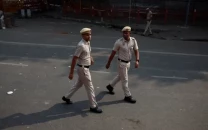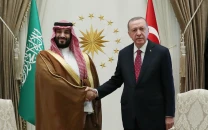Indian government faces backlash over Internet blocking
Twitter users, legal experts and analysts criticise the government's approach..

The government over the past week has ordered Internet service providers to block 309 webpages, images and links on sites including Facebook, Twitter, Wikipedia, news channel ABC of Australia and Qatar-based Al-Jazeera. The URL of a blog hosted on The Express Tribune exposing a social media campaign seeking to inflame Muslims regarding the violence against the Rohingya in Burma was also blocked.
The orders were an effort to halt the spread of inflammatory material and rumours that Muslims were planning to attack students and workers who have migrated from the northeast region to live in Bangalore and other southern cities.
But Twitter users, legal experts and analysts criticised the government's approach.
"The officials who are trusted with this don't know the law or modern technology well enough," Pranesh Prakash, programme manager at the Centre for Internet and Society research group, told AFP.
"It is counter-productive. I accuse them of monumental incompetence, given that the main problem is that they are getting really bad advice.
"I hope that this fiasco shows the folly of excessive censorship and encourages the government to make better use of social networks and technology to reach out to people."
Among the content blocked were photographs from Myanmar in the British Daily Telegraph, a parody Twitter account pretending to be from Prime Minister Manmohan Singh and dozens of YouTube videos.
ABC issued a statement saying it was "surprised by the action and we stand by the reporting" after one of its stories about ethnic unrest between Muslims and Buddhists in Myanmar was included on the blocking list.
Vivek Sood, senior Supreme Court lawyer and an author on Internet legalisation, said he believed the government was acting unlawfully.
"It's completely illegal under the Indian IT Act," he told the Economic Times. "It's a gross abuse of power by the government."
The government has blamed the Internet sites for fanning fears that resulted in tens of thousands of migrants fleeing back home to the northeast last week.
Ministers have defended the blocking and complained they have not received cooperation from websites and social network groups over "inflammatory and harmful" content.
Journalist Kanchan Gupta, who is often critical of the government and had his Twitter account blocked in recent days, called the move a "political vendetta".



















COMMENTS
Comments are moderated and generally will be posted if they are on-topic and not abusive.
For more information, please see our Comments FAQ